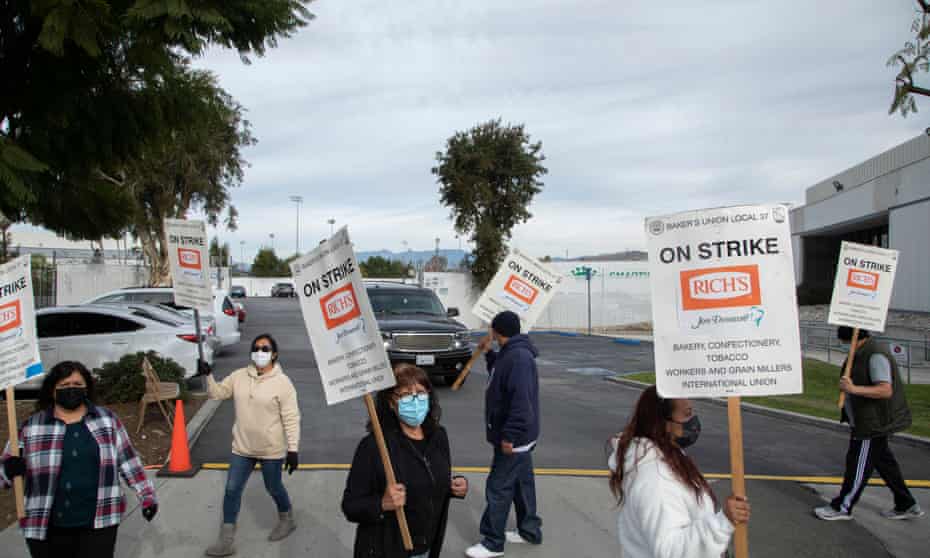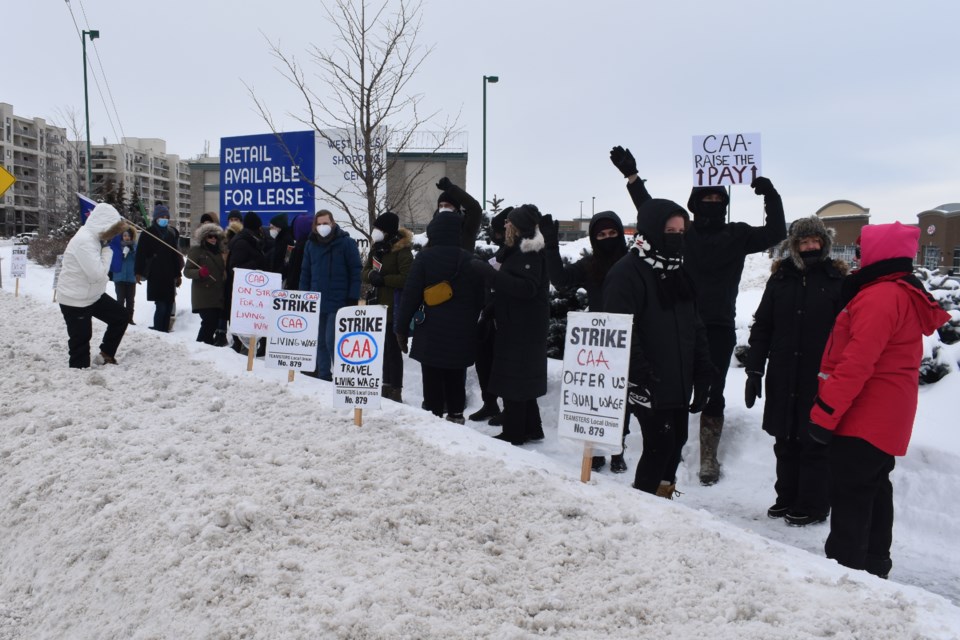By Anabel Munoz
SANTA FE SPRINGS, Calif. (KABC) -- Elvia Castillo went on strike for the first time back in November 2021.
"Just by seeing them on the picket line, it makes you strong," she said of the now months-long strike at a rally Thursday. For 15 years, Castillo has decorated cakes that end up at retailers like Baskin Robbins, Cold Stone Creamery, and Safeway.
Some supply lines finish as many as 36 cakes per minute, said Castillo. "Our line is between 12 and 11 per minute," she added. Roughly 100 workers are on strike, while a few dozen continue to working, according to the union that represents the workers, Bakery, Confectionery, Tobacco Workers, and Grain Millers (BCTGM) International Union Local 37.
In April, Maria Palomo will have worked at the company for 22 years. She said the long, fast-paced work is tough on her hands, and believes they deserve a fair raise given increased demands for production. They're asking for a $1 per hour increase each year for three years. "It's a union contract and some workers have been there for about 19 years and they're still making $17.80 an hour," said Miguel Perez of the current wages.
Several lawmakers including U.S. Senator Alex Padilla and Congresswoman Linda Sánchez are supporting the workers -- predominantly Latina women -- urging the company to reach a fair agreement as soon as possible. Sanchez's letter cited a study that suggested that in Los Angeles, a single adult must make $19.35 an hour to support oneself, and more if they have children.
Rich Products Corporation told Eyewitness News that workers at the Santa Fe springs factory, Jon Donaire Desserts, make on average $18.21 an hour, and that its offer included a $1.60 cent per hour raise over three years, stressing it's a family owned company that provides workers with competitive wages and high-quality benefits.
A statement reads in part:
"Rich's associates, many of whom are multi-generational and average 10 years of tenure at the plant, currently have a platinum health-care plan, up to 38 days of annual paid time off; and a company-paid pension plan. The company recently presented its last and final contract offer that would have retained all that, and also included wage increases for each of the three years of the next contract."
While the company said its offer includes increasing the percentage of pays for employees health insurance, the union -- which does not dispute the company provides good benefits -- said that under one offer that includes the $1 raise, workers would have to pay more out of pocket for health insurance, essentially losing the raise.
The two parties have appealed to the National Labor Relations Board and for now there is no date to continue negotiations.
Workers at the Jon Donaire plant in California are struggling to cope – so why won’t the factory’s owner raise its offer?

Michael Sainato
Sat 5 Feb 2022
More than 150 workers at the Jon Donaire Desserts plant in Santa Fe Springs, California, have been on strike since early November over wages, healthcare coverage and working conditions.
The dispute centers on food workers, hailed as heroes early in the pandemic, who are struggling to cope with spiraling costs of living as the company that employs them posts billion-dollar revenues.
Amazon chews through the average worker in eight months. They need a union
Steven Greenhouse
Workers at the plant, which makes ice-cream cakes for companies such as Baskin-Robbins, Walmart and Safeway, are asking for a $1 an hour raise every year for three years with no cuts to their healthcare costs.
Rich Products Corporation, the plant’s owner, has made two offers to the Bakery, Confectionery, Tobacco Workers and Grain Millers’ International Union, which represents the workers. One proposed a 50¢ raise over one year and 55¢ raises for the following two years. The other offered an overall wage increase of $4.10 an hour, but included significant increases to the cost of workers’ healthcare.
“Right now, we’re paying around $130 a month for healthcare. They want to increase it to $480 for a single person and $780 for a family plan,” said Miguel Perez, who has worked at the Jon Donaire plant for 12 years.
“The Rich Corporation is not fulfilling its obligation to take care of its employees. They had us working through the whole pandemic. Everybody showed up to work. We all met our quotas as far as production [is concerned], and now that the contract is up they’re trying to nickel-and-dime us into an unacceptable raise.”
Workers have highlighted the company owners’ immense wealth and profits in their pressure to secure the raises they are on strike to receive. The chief executive and owner of Rich Products, Robert Rich Jr, has a net worth of $4.9bn. In the first year of the pandemic, Rich Products reported more than $4bn in revenue.
Perez also described workplace grievances, including being informed of forced overtime with just a few minutes left at the end of a shift, often being denied permissions to take time off from work to go to a doctor’s appointment, and the treatment of a workforce that is roughly 90% women by supervisors who are mostly men.
“Every week we see a woman coming out of the office crying, because she felt like she was disrespected,” added Perez. “We have a lot of that going on. Sometimes the male supervisors are cursing at them, yelling at them, or even making inappropriate gestures.”
Jon Donaire denied these allegations, claiming the union has never addressed these grievances with the company. “There are unfortunately many stories with baseless claims that we’ve had to refute throughout this process – and we will continue to do so,” said a spokesperson.
It also cited long tenures of employees and an internal survey of workers in March last year, where 80% of Santa Fe Springs’ employees said they would recommend Rich’s to others as a “great place to work”.
Cristina Lujan has worked at the Jon Donaire plant for 19 years. Most recently she was on the cake assembly line, decorating cakes at a rate of around 13 a minute.
Throughout her time at the plant Lujan said production demands have gotten higher and higher but her pay has not kept up with the increased demands on her nor with the costs of living in the Los Angeles area.
“When I started, I was well above minimum wage,” said Lujan. “Now, 19 years later, I’m barely above minimum wage. Our raises have been pennies every contract.”
Workers at the plant make on average less than $17 an hour, compared to workers at a Rich Products’ facility in Tennessee, who are paid on average $6 an hour more.
“I think he [Robert Rich Jr] can afford to pay us the $1 more that we’re asking for,” said Lujan. “Everything is going up, gas, food, rent and we’re living paycheck to paycheck. Everybody’s tired of feeling that frustration and stress daily. Their big company model is based on family first, but the way they treat us, I don’t think that’s the way you treat family.”
On 17 December, workers rejected the company’s contract offer, continuing the strike. Rich Products responded by declaring an impasse in new union contract negotiations and enacting the wage increases they proposed to workers who crossed the picket line, which the company said amounts to almost 60 workers. The company also paid workers who crossed picket lines back pay and a gain sharing bonus.
The union has filed unfair labor practice charges against the company for imposing a contract on the unionized workforce that was voted down by workers, which is currently under review at the National Labor Relations Board. Several elected officials, including the Los Angeles County Board of Supervisors, 25 congressional representatives and seven US senators, have called on the Rich Corporation to bargain in good faith with the union and reach a fair contract.
“Rich’s is especially concerned about what the strike has meant for striking associates who have now gone weeks without a paycheck, are not eligible for state unemployment benefits, and will soon forfeit the high-quality healthcare they told the company they wanted to retain,” said a spokesperson for Rich Products.
“We are pleased many of our associates have continued to come to work since the strike began and plant production has continued. They deserve the wage increase we proposed and to retain their uninterrupted high-quality healthcare.
“We welcome back all striking workers with open arms and will provide the same considerations to them.”
















